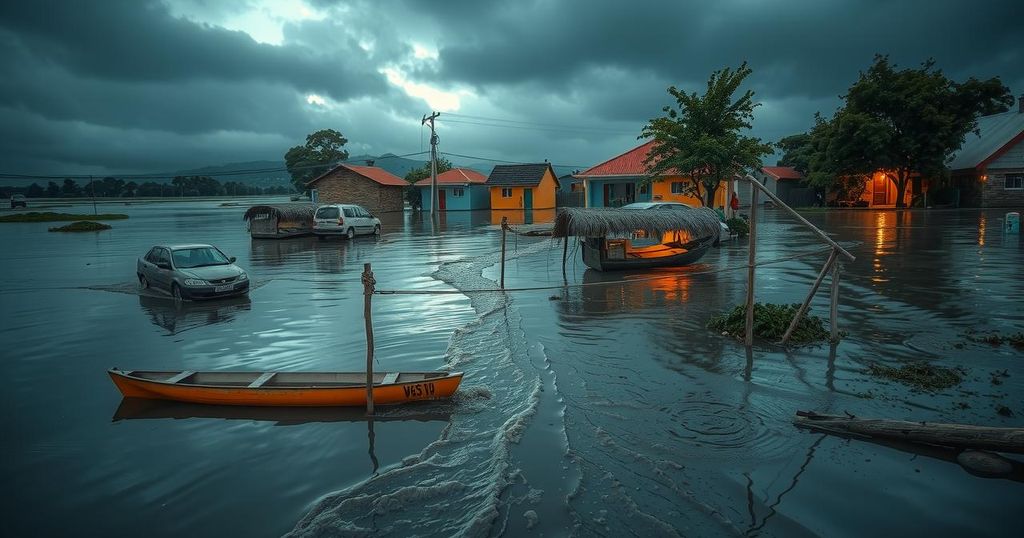Research by the World Weather Attribution network indicates that climate change has made seasonal floods across parts of Africa significantly worse, resulting in approximately 1,500 deaths and over one million displacements in 2024. Experts emphasize the need for urgent climate action as the continent, despite its low carbon emissions, faces severe impacts from global warming.
The impact of global warming on weather patterns has become increasingly evident, particularly in Africa, which, despite contributing only a small fraction of the world’s greenhouse gas emissions, faces severe climate challenges. Recent research conducted by the World Weather Attribution (WWA) network reveals that climate change has exacerbated the rainy season in numerous African nations in 2024, resulting in devastating floods. These floods have led to a humanitarian crisis, with around 1,500 fatalities and the displacement of over one million individuals across West and Central Africa, as reported by the UN Office for the Coordination of Humanitarian Affairs (OCHA). Scientists highlight that human-induced climate change linked to fossil fuel consumption has intensified seasonal rainfall across critical regions such as the Niger and Lake Chad basins, suggesting an increase in rain intensity by 5 to 20 percent this year alone. Izidine Pinto, a researcher at the Royal Netherlands Meteorological Institute, emphasized the troubling nature of these findings, stating that “spells of heavy summer rainfall” have emerged as the “new normal” for countries like Sudan, Nigeria, Niger, Cameroon, and Chad. Furthermore, he noted that with each incremental rise in global temperatures, the likelihood of experiencing extreme flooding escalates. In a warning against complacency, Pinto urged participants at the upcoming United Nations COP29 climate summit in Azerbaijan to expedite the transition away from fossil fuels. The urgency of this message is underscored by projections indicating that if global temperatures rise by 2 degrees Celsius above pre-industrial levels, severe flooding may become an annual occurrence. WWA researchers specifically examined the situation in Sudan, where decades of conflict have displaced millions and forced many into flood-prone regions, aggravating their vulnerability. Joyce Kimutai, a researcher at the Centre for Environmental Policy at Imperial College London, pointed out the stark contrast between Africa’s minimal carbon footprint and the significant impacts of climate change, stressing, “Africa has contributed a tiny amount of carbon emissions globally, but is being hit the hardest by extreme weather.” Additionally, experts called attention to the exacerbating effects of inadequate infrastructure maintenance and the need for improved early warning systems to enhance community preparedness for such events. Clair Barnes from the Centre for Environmental Policy stated, “This is only going to keep getting worse if we keep burning fossil fuels.”
The relationship between climate change and extreme weather patterns is becoming an area of increasing concern globally. In Africa, which contributes minimally to global carbon emissions, there is a marked vulnerability to the impacts of climate change, particularly regarding rainfall patterns and flooding. The nexus between human activity—especially the burning of fossil fuels—and severe weather phenomena is highlighted by various researchers and organizations that monitor climate trends. The need for urgent action in the face of rising global temperatures has sparked discussions at international climate summits, where nations come together to formulate strategies aimed at mitigating these challenges through reductions in greenhouse gas emissions.
In summary, the changing climate is having a disproportionate impact on Africa, where even marginal increases in global temperatures are leading to significant and tragic outcomes such as intensified flooding. The call to action is clear; without a concerted effort to transition from fossil fuels to sustainable energy sources, the continent will continue to bear the brunt of climate-induced disasters. International cooperation and proactive measures to enhance infrastructure and community resilience are essential to address the challenges posed by climate change.
Original Source: www.aljazeera.com







